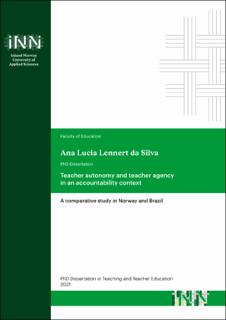| dc.contributor.author | Lennert Da Silva, Ana Lucia | |
| dc.date.accessioned | 2021-11-22T10:05:40Z | |
| dc.date.available | 2021-11-22T10:05:40Z | |
| dc.date.issued | 2021 | |
| dc.identifier.isbn | 978‐82‐8380‐304‐4 | |
| dc.identifier.isbn | 978‐82‐8380‐305‐1 | |
| dc.identifier.issn | 2464‐4390 | |
| dc.identifier.issn | 2464‐4390 | |
| dc.identifier.uri | https://hdl.handle.net/11250/2830667 | |
| dc.description | © The author (2021) This material is protected by copyright law. Without explicit authorisation, reproduction is
only allowed in so far it is permitted by law or by agreement with a collecting society. | en_US |
| dc.description.abstract | This study addresses teacher autonomy and teacher agency in public lower‐secondary schools in one Latin American country (Brazil) and one European country (Norway) that have different models of educational governance based on the implementation of test‐based accountability systems.
This study employs semi‐structured interviews and secondary data to investigate teachers’ perspectives, and document analysis of curriculum policy to investigate the accountability context in which teachers’ work.
Theoretically, this study draws on literature concerning teacher autonomy and teacher agency to investigate teachers’ perceptions of their autonomy and responses to policy. This study also applies institutional logics to describe the context of accountability in which teachers are situated.
The findings show national actors interacting with the accountability logic to adapt this logic to national contexts. In addition, the findings show teachers engaging with the logic of accountability to make meaning of their actions in their local contexts of practice.
Further, the findings show that the relationship between teacher autonomy and teacher agency in educational contexts marked by accountability is not necessarily linear. First, teachers perceive that they have autonomy to decide on their teaching and planning at the classroom level irrespective of models of educational governance. However, teachers report that they do not participate often in professional collaboration in schools. Professional collaboration may allow for collegial teacher autonomy or decision‐making at the school level. Teachers also report low perceived social value and policy influence. These two factors may provide insight into professional teacher autonomy in which teachers are able to influence the framings of the profession at the policy level.
Second, despite educational systems of strong state control that restrict teacher autonomy, teachers are able to achieve agency by using reflexivity and creativity to define their own practices in the interest of students and learning. In this sense, teachers may be policy adopters, but they also can adapt and translate accountability policy to their local situations, although bounded by their contexts. | en_US |
| dc.description.abstract | Sammendrag
Denne studien undersøker læreres autonomi og aktørskap i offentlige ungdomsskoler i et latinamerikansk land (Brasil) og et europeisk land (Norge) som har forskjellige modeller for styring av utdanning basert på implementering av testbaserte ansvarliggjøringssystemer.
I studien blir det anvendt semistrukturerte intervjuer og sekundære data for å undersøke lærernes perspektiver i tillegg til dokument analyse av læreplanpolitikk for å undersøke ansvarliggjøring av lærernes arbeid.
Det teoretiske grunnlaget forstudien er forsking og teorier om læreres autonomi og aktørskap for å undersøke deres oppfatning av sin autonomi og reaksjoner på utdanningspolitikk. Videre brukes det i studien også institusjonell teori for å analysere konteksten for ansvarliggjøring der lærerne befinner seg.
Funnene viser at nasjonale aktører interagerer med ansvarliggjøringslogikken for å tilpasse denne logikken til nasjonale kontekster. I tillegg viser funnene at lærere engasjerer seg i denne logikken for å gi mening til handlingene sine i deres lokale kontekster.
Videre viser funnene at forholdet mellom lærerautonomi og aktørskap i pedagogiske kontekster preget av ansvarliggjøring ikke nødvendigvis er lineært. For det første oppfatter lærerne at de har autonomi til å bestemme undervisning og planlegging på klasseromsnivå, uavhengig av modeller for styring av utdanning. Lærere rapporterer imidlertid at de deltar i liten grad i profesjonelt samarbeid på skolene, noe som kan gi lite rom for kollegial lærerens autonomi eller beslutningstaking på skolenivå. Lærere rapporterer også at de oppfatter lav sosial verdi og politisk innflytelse, noe som kan gi innsikt i profesjonelle læreres autonomi der lærere er i stand til å påvirke profesjonsrammer på politisk nivå.
For det andre er lærerne i stand til å oppnå aktørskap til tross for utdanningssystemer med sterk statlig kontroll som begrenser lærernes autonomi, ved å reflektere og være kreativ for å definere sin egen praksis i interesse av studenter og læring. I denne forstand kan lærere være politikk adoptere, men de kan også tilpasse og oversette ansvarliggjøringspolitikk tilsine lokale situasjoner, selv om de er avgrenset av sine kontekster. | en_US |
| dc.language.iso | eng | en_US |
| dc.publisher | Høgskolen i Innlandet | en_US |
| dc.relation.ispartofseries | Ph.d.-avhandling i profesjonsrettede lærerutdanningsfag;22 | |
| dc.relation.ispartofseries | PhD in Teaching and Teacher Education;22 | |
| dc.subject | teacher autonomy | en_US |
| dc.subject | teacher agency | en_US |
| dc.subject | Brazil | en_US |
| dc.subject | Norway | en_US |
| dc.subject | læreres autonomi | en_US |
| dc.subject | lærerautonomi | en_US |
| dc.subject | læreres aktørskap | en_US |
| dc.subject | lower-secondary school | en_US |
| dc.subject | ungdomsskole | en_US |
| dc.subject | Norge | en_US |
| dc.subject | Brasil | en_US |
| dc.title | Teacher autonomy and teacher agency in an accountability context: a comparative study in Norway and Brazil | en_US |
| dc.type | Doctoral thesis | en_US |
| dc.description.version | publishedVersion | en_US |
| dc.subject.nsi | VDP::Samfunnsvitenskap: 200::Pedagogiske fag: 280 | en_US |
| dc.source.pagenumber | 175 | en_US |
